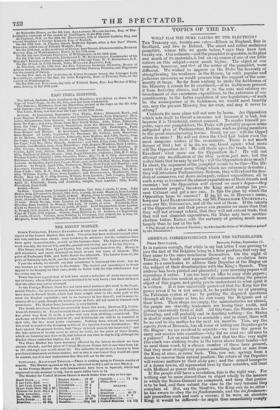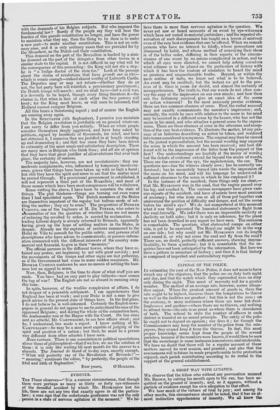ORIGINAL CORRESPONDENCE FROM THE NETHERLANDS:
DEAR SPECTATOR, Brussels, Friday, September 17.
IT is curious enough, that while in my last letter I was proving to you the fact of the Belgians being in a false position, that very day they came to the same conclusion themselves. On the night 0±' Tuesday, the heads and representatives of the revolution here came to a conclusion to address their Deputies at the Hague on the subject of their dissatisfaction with the King's Speech. This address has been printed and placarded ; your morning papers will reproduce it entire. I am too busy an idler to copy state papers; and shall therefore content myself with communicating the precise object of this paper, and giving you to understand in what spirit it is written. It is now universally perceived that the King has the power (even if he is not using it, as lie probably is) of pursuing the Fabrician system of war: by putting the disputed questions through all the forms of law, he can weary the Belgians out of their lives. Their shops are empty, the manufactories are closed, the people are starving, tradesmen are losing their credit, and, getting excessively tired of drill. All this time, the States are de- liberating, and will probably end in deciding nothing : the States in double numbers will have to assemble ; and in short, there will be no end to the matter for the next six months. This, say the esprits forts of Brussels, has all come of letting our Deputies go to the Hague : we are resolved to separate-we have the power to carry our resolve into execution-why did we send our old men to a palaver? Let us send theni word, and that too this very night (the clock was striking twelve in the tower above their heads)-let us send them word, by a chosen number of those here present, that they must straightway procure something direct or sure from the King at once, or come back. This, you see, springs from a desire to recover their natural position: the return of the Deputies will restore matters to their statu quo; and the armed bourgeois of a dozen towns, all represented here by their notables, will treat with Holland as power with power. If the people will have a revolution, this is the right way. For nothing can be more absurd than to object wholly to the manner in which the States-General are composed, and deny that justice is to be had, and then submit the case to the very tribunal they complain of. But, say the Moderes, the King can do no other: he has sworn to obey the loi fondamentale, and the lot fondamen- tale prescribes such and such' a course: if he were an absolute 'King, it ivOnld be different-he might then immediately comply with the demands of his Belgian subjects. But who imposed the fundamental law ? Surely if the people say they will bear the burden of this pseudo constitution no longer, and have the power to maintain what they say, then the thing to be done is to make a new pact—to make another constitution. This is not an ordi- nary case, and it is only ordinary cases that are provided for by the Grondwet, as the Dutch call their constitution. This demand on the part of the Bruxellois is backed by a simi- lar demand on the part of the delegates from other towns in a similar state to the capital. It is not difficult to say what will be the consequence of this proceeding : the King will not stir a step : he is "a bUdge doctor of the stoic fur." Look at the passage about the storm of revolutions that have gronde sur sa tete- which is comic enough—indeed almost worthy of Lulworth Castle. The Deputies may or may not return—whether they do or not, the hot party here will establish a provisionary government ; the Dutch troops will march ; and we shall have—not a civil war, it is devoutly to be hoped, though every thing threatens it—the chance is, that when in face of each other the two powers will treat; for the King must know, or will soon be informed, that Holland cannot conquer Belgium. All this bears a threatening aspect ; and of course the English are running away again. In the SPECTATOR (4th September), I perceive you maintain that the Belgian revolution is justifiable on no ground whatever. I am sorry to differ from you entirely. When an whole people consider themselves deeply aggrieved, and have long asked by petitions, signed by hundreds of thousands, for relief, and have not obtained it, I conceive they are justified in at length standing up and demanding it ; and that too since they have been driven to extremity of the most ample and satisfactory description. There are many men in Belgium who think thus ; and all are of opinion that they have that great justifier of allrevolutions that ever took place, the certainty of success. The majority here, however, are not revolutionists : they are moderate complainants, who, influenced by temporary inconveni- ence, grieve that things have been taken up with so high a hand; but still they have the spirit and sense to see that the matter must be carried through. If a provisional government is established, it will not represent a third part of the Bruxellois ; and most of those names which have been most conspicuous will be withdrawn. Since writing the above, I have been to ascertain the state of things. Thern plot thickens—things are turning out even worse than I had speculated upon. The Dutch members of the States are themselves impatient of the regular but tedious mode of set- tling the matter; they cry to arms ! The proposition of DONKER CURTIUS, one Of the bugbears of M. DE POTTER, who refers to alcommittee of ten the question of whether there are not means of reducing the revolted to order, is carried by acclamation. A leading Liberal deputy is already returned to Brussels, apparently having given up the hope of settling matters in the States, in despair. Already are the captains of sections summoned to the Hotel de Ville to consult for the public safety, and persons of all descriptions who have advice to communicate, or possess inform- ation connected with the different interests of the country com- mercial and financial, to give in their "memoirs." The official persons in the different towns, where they have re- tained any power, are beginning to act with great severity ; and the movements of the troops and other signs are fast gathering, as if the Government had come to some sudden resolution. Mr. DONKER CURTIUS confesses he sees no means of settling the busi- ness but an appeal to arms. Now, then, Belgians, is the time to show of what stuff you are made. You have had an easy part to play hitherto—now comes the tug of war! The English are not so absurd in running away this time.
In spite, however, of the warlike complexion of affairs, I do not despair of a peaceable settlement. I am apprehensive that England has been at work; and your Duke is not a man to (rive good advice in the present state of things here. In the first place, I do not believe he is well-informed. Certainly the English news- papers in general do not appear to me to-understand the case of the oppressed Belgians ; and during the whole of the commotion here, the Ambassador was at the Hague with the Court. He has since sent an attaché, Mr. CARTWRIGHT, to see how affairs stood ; and he, I understand, has made a report. I know nothing of Mr. CARTWRIGHT—he may be a man most capable of judging of the spirit and position of a nation ; but then, he must be a person very different from other attaches I have seen.
Nous verrons. There is one consolation in political speculations above those of philosophical—that if we live, we see the solution of them : it is only like waiting till next month for the answer to a charade. The journal de Gand of to-day says, smartly enough, " What will posterity say of the Revolution of Brussels ?"— " meaning," continues the editor," by posterity, the people of the 23rd and 24th of September."



























 Previous page
Previous page